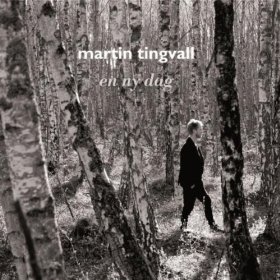
Martin Tingvall
En ny dag
Skip ****
The leader of one of the most acclaimed and best selling young European piano jazz trios currently around En ny dag ("a new day") is Swedish pianist Martin Tingvall’s first solo piano album, and like the trio it’s very different to anything you’ll hear, despite appearances.
Tingvall, and maybe critics of his approach will say it’s simplistic and naïve, goes for the obvious improvising route, ie melodic variation. He doesn’t really deal with abstraction in the sense that there are dense harmonies and structural idiosyncrasies, lots of dissonance and knotty rhythms. But there’s much more going on beneath the surface and the tunes are more than good and he builds them via softly realised cycles and subtle shifts in not so much tempo as mood and register. They speak to you. I’d compare him to a popular novelist whose books are readable and have a certain logic to them, rather than to a writer who wishes to redo the rules of the novel and make sure you know that’s what’s going on.
There are naturalistic aspects to some of the song titles, all in Swedish, with English translations provided. So you get a falling star and a constellation bookending the album, with thunder (track six), the light and joy of midsummer, and also little asides in terms of song title choices that link to more domestic references.
All the compositions are by Tingvall himself, and they all tread a path between quietly melancholic interpretation and contemplative expression. There are no miniature anthems, thank goodness, and it never becomes some sort of vainglorious hymn of awkward quietude and introspection, but there is a positive force at work that is hard to pin down. If you see him with the trio or at a rarer solo concert you’ll know what I mean: you just feel as if you’re glad you made the effort to come, and that what you’ve just heard has made up for the nonsense of the day gone by.
Tingvall who was born in the southern Swedish province of Skåne 37 years ago studied jazz piano and composition at the Malmö Academy of Music, moving to Hamburg in 1999, and founded the trio four years later. His first inspiration was McCoy Tyner, something now deep in the background as is Scandinavian folk music to an extent although it’s within touching distance just about. Occasionally there are hints of the approach of Abdullah Ibrahim here and there although despite claims to the contrary I can’t hear the link to Chopin or Bach as primary classical influences that some listeners ascribe to his background, at least on this album where everything is out in the open. A very impressive album from a fine player who has a highly persuasive musical personality all of his own.
Stephen Graham
Out now